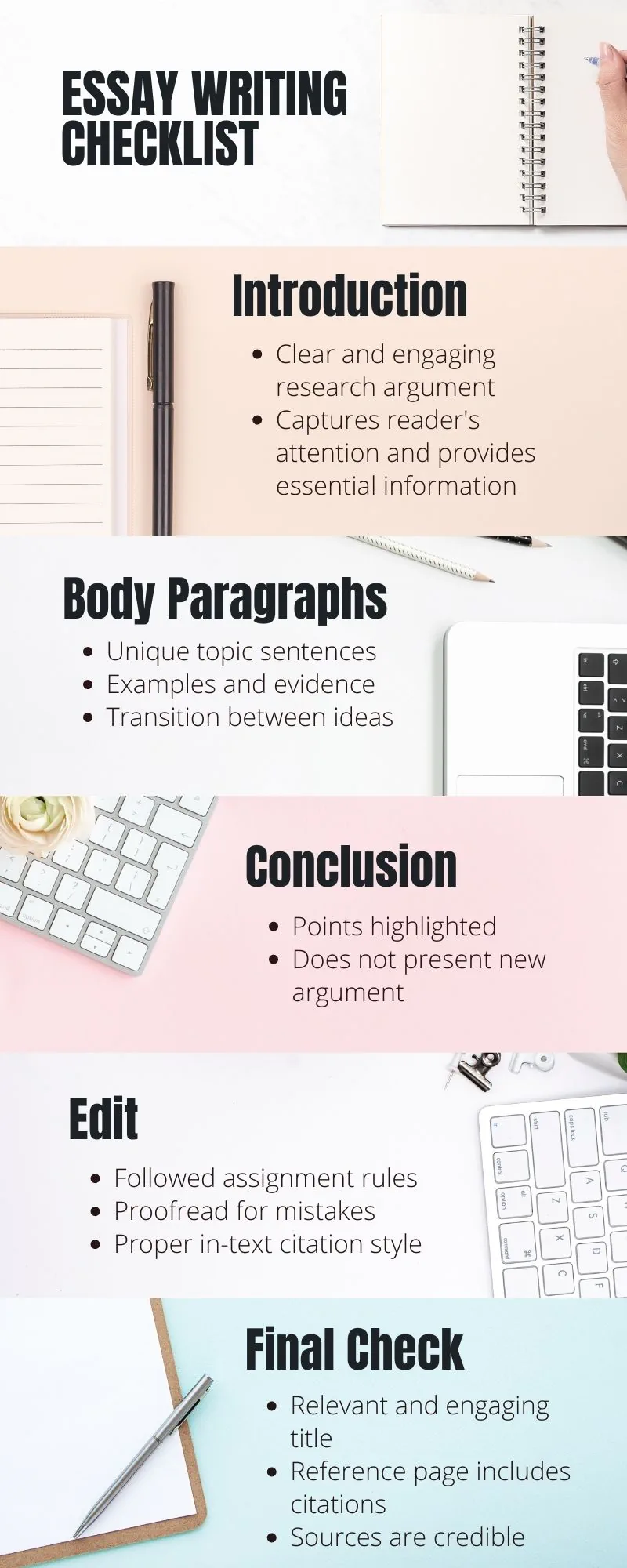Checklist: Writing an essay
-
Melisa Bestel
- August 24, 2023
Essay guidelines
- How to write an essay
- Common essay types
- Argumentative essay
- Autobiography essay
- Biography essay
- Cause and effect essay
- Critical analysis essay
- Compare and contrast essay
- College application essay
- Common app essay
- Definition essay
- Descriptive essay
- Evaluation essay
- Explanatory essay
- Expository essay
- First person essay
- Informal essay
- Literary analysis essay
- Narrative essay
- Opinion essay
- Personal statement essay
- Persuasive essay
- Poetry essay
- Process essay
- Profile essay
- Reflective essay
- Rhetorical analysis essay
- Scholarship essay
- Statement of purpose essay
- Synthesis essay
- Length of an essay
- Outlining an essay
- Essay structures
- Essay topic ideas
- Introduction
- Body paragraphs
- Conclusion
- Citing sources in APA
- Citing sources in MLA
- Avoiding plagiarism
- Essay checklist
Academic essays are about offering persuasive arguments using evidence that include analysis of the evidence and reasonable interpretation. An academic essay needs to have an introduction, body paragraphs, and a conclusion.
Although it is not so complicated, writing an academic piece still requires a lot attention, and we’re here to help you with a thorough checklist.
Feel free to use this checklist before or after writing your paper, but don’t forget to definitely proofread and check for common mistakes.

- I have a clear and engaging research question/argument, which I present in my introduction as a thesis statement.
- My introduction successfully captures the reader’s attention and provides essential information regarding my topic.
- My body paragraphs contain unique topic sentences that are tied to my thesis statement.
- I present examples and pieces of evidence to support my topic sentences in my body paragraphs.
- The transition between my ideas in the body paragraphs is clear and smooth.
- I highlight every point I made throughout my essay in conclusion and show a connection between one another.
- My conclusion does not present a new argument.
- I used proper in-text citation style in my paper when paraphrasing or quoting someone else’s ideas.
- My sources are credible and academic.
- I have a reference page, and it includes the citations of every source I used (according to the style required in the assignment sheet; mostly APA or MLA).
- After finishing my essay, I found a relevant and engaging title.
- I made sure that I followed the formatting rules given in my assignment sheet (including length, font, page spacing, capitalization, etc.)
- I proofread my essay for any typos or punctuation mistakes, and style of language.
Important
️It is essential to be entirely sure that you didn’t use someone else’s ideas (including paraphrasing) in your pape without citing.Contents
Recently on Tamara Blog
Duygu Demiröz
September 21, 2023
Duygu Demiröz
August 26, 2023
Duygu Demiröz
August 24, 2023
Duygu Demiröz
August 14, 2023
Duygu Demiröz
August 8, 2023
Asena Kocakusak
December 24, 2022